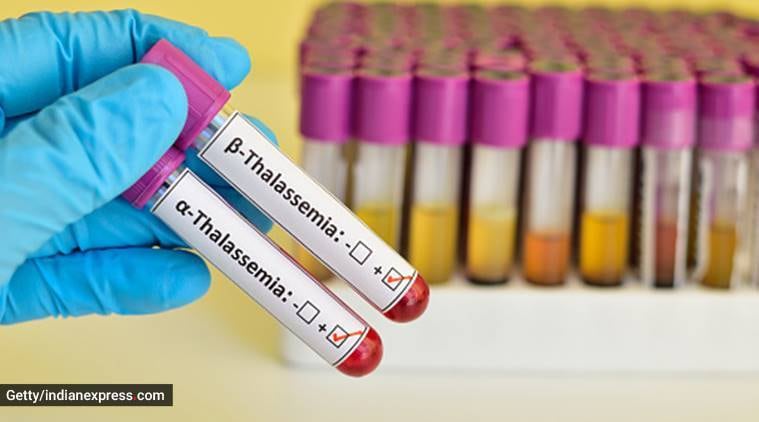 Thalassemia patients require lifelong blood transfusion. (Source: Getty Images)
Thalassemia patients require lifelong blood transfusion. (Source: Getty Images)
A Twitter thread has raised a serious medical emergency. Some thalassemia patients have allegedly been unable to avail blood transfusion at Lucknow’s Sanjay Gandhi Postgraduate Institute of Medical Sciences (SGPGI), a centre that has patients not only from the state but from across India.
A genetic blood disorder, thalassemia requires lifelong regular blood transfusions, usually administered every two to five weeks. And with nearly 40 million carriers, India is the thalassemia capital of the world. But recent tweets from patients registered with SGPGI, indicated difficulty in getting the service.
Here’s what thalassemia patients had claimed:
I’m a #thalassemic patient and there are 5000 other patients who need blood transfusion every 15 day or 21 days. This figure is only for Lucknow patients. If we count outstation also then the figures are going to cross 20,000. We all are registered patients of #SGPGI since
— Pooja.M1102 (@PoojaMani1102) April 28, 2020
#ThalassemiaMajor!We 300 – 500 patients need regular #bloodtransfusion in about 2 weeks. Now that #SGPGILucknow denied transfusion because of #CoronaPandemic all our lives are at stake.If not corona we’re gonna die anyway. #TreatmentDenyThalassemicsdie@myogiadityanath @PMOIndia
— anjie (@anjie0891) April 27, 2020
SGPGI is among the hospitals that have been turned into coronavirus treatment centres, which, according to Dr Shubha Phadke, Head of Department, Medical Genetics, the department that deals with thalassemia at SGPGI, has led to some challenges. Speaking to indianexpress.com, Dr Phadke clarified, “Now that the hospital is being used for COVID-19 treatment, it has had to reorganise all its buildings for non-coronavirus patients which posed practical challenges in the past week.”
Some patients, as Pooja mentions in a tweet, had been asked to get blood transfusion done at other centres.
told to get blood from some other blood bank and tranfuse in some private nursing Home!
As it is #blood #transfusion is a risky thing and PGI has been really safe for us, we all have faith in PGI for treating us. But after covid is over that ward will become so risky for us— Pooja.M1102 (@PoojaMani1102) April 28, 2020
Thalassemia patients are at risk of infection and it has been seen that COVID-19 has a worse impact on patients with comorbidities, said Dr Phadke. “Visiting the hospital, which now has its services dedicated to COVID treatment, could increase the risk of exposure to infection. So we recommend they visit other smaller centres, which are less likely to be crowded. That is what we have been trying to convey to patients,” she said.
Reports on shortage of blood supply have been coming from various corners ever since the lockdown, like the states of Maharashtra and West Bengal, besides Uttar Pradesh. In another UP town, Manjhanpur, the blood bank with a capacity of 100 units was recently left with 16 units only, as per reports. “Some patients are no longer being able to get blood for free. There has been a shortage of donors, routine operations have also been put on hold now so there is lack of blood units. So some of them may have to arrange for their own donors for the time being,” added Dr Phadke.
Patients coming to SGPGI will now have to get themselves tested for coronavirus first. The doctor added that the hospital has also been trying to provide blood transfusion outside of its premises, besides catering to those with serious health conditions. “But I am not sure if allowing healthy patients to come in with their family members for routine blood transfusion would be safe, which is why we have been recommending alternate measures to help patients. We are trying to facilitate as much as possible but things are not so easy anymore.”
Read| Coronavirus: People with thalassemia face “blood shortage”, appeal for blood donations
Joint Secretary of the Health Ministry, Lav Agarwal, announced on April 21, 2020, all hospitals were to continue blood transfusion. He had said in a press briefing, “Union Health Minister Dr Harsh Vardhan has written to all the states and has asked them to ensure adequate availability of blood in blood banks. Services, especially blood disorder such as thalassemia and haemophilia, which require regular blood transfusion, will be continued in all hospitals.”
What does the National Blood Transfusion Council (NBTC) say
The National Guidance to Blood Transfusion Services in India in Light of COVID-19 Pandemic, released by NBTC and the Health Ministry, stated that sharing and transfer of “screened or otherwise low-risk blood and blood components” was a potential solution, as per the NBTC guidelines, when the effect of a disease outbreak leads to insufficiency of blood supply as the demand for it continues at a normal level. To safeguard supplies and protect recipients from “unnecessary exposure to a potentially infectious clinical product”, only necessary blood components should be administered.
Emphasising on the need for sufficient blood supply during this situation, the official document stated that at present, there is no data or precedent suggesting risk of transfusion-transmission for COVID-19. “Individuals are not at risk of contracting COVID-19 through the blood donation process or via blood transfusion, since respiratory viruses are not generally known to be transmitted by donation or transfusion,” it said, urging donors to offer help while maintaining social distancing norms and infection control guidelines.